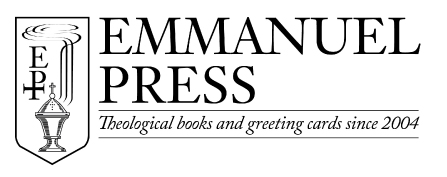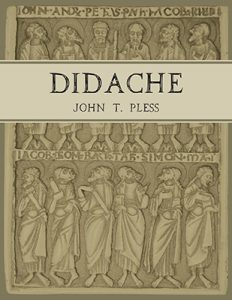THE LATEST NEWS
On the use of ceremonies
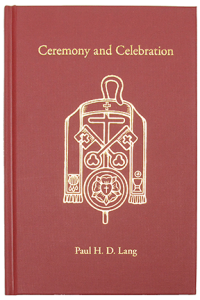 Why is it that some Christians kneel, bow, genuflect, make the sign of the cross on themselves, or hold their hands in a particular fashion during the Divine Service? These physical actions are called ceremonies, which are solemn religious actions that help to confess what we believe.
Why is it that some Christians kneel, bow, genuflect, make the sign of the cross on themselves, or hold their hands in a particular fashion during the Divine Service? These physical actions are called ceremonies, which are solemn religious actions that help to confess what we believe.
As Paul H.D. Lang writes in Ceremony and Celebration, “Communication is not limited to language. We express ourselves to others and we receive impressions from others and from God through signs and symbols. These communications by signs and symbols are often more effective than those of language. While this is true in ordinary life, it is particularly true in the church’s worship. The things communicated there have to do with the mysteries of our holy faith. These deep mysteries cannot, of course, be communicated so as to be understood fully or else they would no longer be mysteries. But signs and symbols often communicate the realities of the mysteries better than language.” (p. 64)
Here are a few brief excerpts on the particular actions, taken from Lang’s much more detailed explanations in his book:
- “For standing, sitting, and kneeling, the general rule is that we stand for prayer and praise, we sit for instruction and for lengthy chants and hymns, and we kneel for confession and adoration.” (p. 66)
- “Bowing and genuflecting are very closely related. A genuflection is merely a more profound bow….Bowing or kneeling when the words of the Nicene Creed are said, ‘And was incarnate by the Holy Ghost…and was made man,’ expresses reverent awe over God’s grace in becoming man in order to redeem us. Luther speaks at length about the meaning of these words and how we should show our appreciation and reverence for the Incarnation.” (p. 68-69)
- “Crossing oneself was practiced by Christians from the earliest centuries and may go back to apostolic times….It is one of the traditional ceremonies that was most definitely retained by Luther and the Lutheran Church in the 16th-century Reformation….The holy cross is the symbol of our salvation. We were signed with it when we were baptized. It is the sign by which the church blesses people and things. By using it we become part of the wonderful history of our faith and companions in the company of the saints. It is right that we should make the sign of the cross frequently and to glory in it, saying with St. Paul, ‘God forbid that I should glory save in the cross of our Lord Jesus Christ’ (Gal. 6:14)”. (p. 72-73)
The Great Works of God: Exodus – A “remarkable set of meditations”
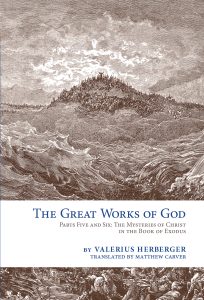 “Behold, I come, in the book it is written of Me.” With this “profound and wonderful word” Valerius Herberger began his remarkable set of meditations in The Great Works of God, Parts Five and Six: The Mysteries of Christ in the Book of Exodus. Now Matthew Carver has produced a highly readable translation of this Lutheran pastor’s devotional commentary.
“Behold, I come, in the book it is written of Me.” With this “profound and wonderful word” Valerius Herberger began his remarkable set of meditations in The Great Works of God, Parts Five and Six: The Mysteries of Christ in the Book of Exodus. Now Matthew Carver has produced a highly readable translation of this Lutheran pastor’s devotional commentary.
This is no dry academic work, although its author was by no means devoid of linguistic expertise and theological erudition. Rather, it is a series of animated exegetical studies, complete with vivid applications, that reflect Herberger’s conviction that the point of scholarship in the service of the Church is ultimately worship. Each of the 134 meditations begins with the word “Jesus.” Even though some 400 years separate our own age from that of Herberger’s, anyone who wishes to learn how to read the Book of Exodus from a Christocentric perspective today will find much that is still uniquely valuable in this splendid volume from Emmanuel Press.
-Dr. Carl P. E. Springer
Now available for pre-order: He Restores My Soul
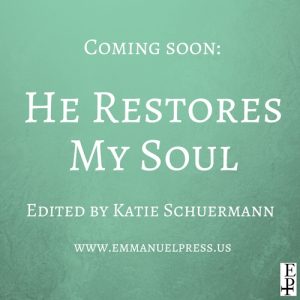 Pre-order He Restores My Soul and save 10%! You’ll find a complete list of authors and topics on the book’s main page along with a link to the cover artist. Stay tuned in the coming months as we reveal the cover art and more details about this unique project!
Pre-order He Restores My Soul and save 10%! You’ll find a complete list of authors and topics on the book’s main page along with a link to the cover artist. Stay tuned in the coming months as we reveal the cover art and more details about this unique project!
While you’re waiting for the release of this new book, have a look at Katie Schuermann’s He Remembers the Barren, the book that served as inspiration for He Restores My Soul.
Meet the book cover artist for He Restores My Soul
Last month we announced a new collaborative project with Katie Schuermann, a book entitled He Restores My Soul. Envisioned as a sequel of sorts to He Remembers the Barren, this new book taps into the wisdom of twelve female writers to broaden the discussion of suffering in the Church and apply the theology of the cross to a wider range of topics. (We’ll be posting a complete list of authors and topics very soon.)
Now it is our pleasure to announce the artist from whom we have commissioned a painting for the book cover of He Restores My Soul. Rebecca Shewmaker is an artist working in the Dallas-Fort Worth area. She holds a Bachelor of Arts in Art History and Visual Arts from Rice University (2006) and a Master of Fine Arts in Painting and Intermedia from Texas Women’s University (2018), where she also taught Art Appreciation, Watercolor, and Basic Drawing classes. Recently her work was included in the Good Shepherd Institute’s Sola Faith-Grace-Scripture exhibition at Concordia Theological Seminary in Fort Wayne, Indiana. Selections from her body of work have been shown in several galleries in the Dallas-Fort Worth area, where she lives with her husband, Tim, who is the music director at Our Redeemer Lutheran Church in Dallas. When not making art, Rebecca enjoys singing in the church choir, knitting, listening to audiobooks, and entertaining her two cats.
working in the Dallas-Fort Worth area. She holds a Bachelor of Arts in Art History and Visual Arts from Rice University (2006) and a Master of Fine Arts in Painting and Intermedia from Texas Women’s University (2018), where she also taught Art Appreciation, Watercolor, and Basic Drawing classes. Recently her work was included in the Good Shepherd Institute’s Sola Faith-Grace-Scripture exhibition at Concordia Theological Seminary in Fort Wayne, Indiana. Selections from her body of work have been shown in several galleries in the Dallas-Fort Worth area, where she lives with her husband, Tim, who is the music director at Our Redeemer Lutheran Church in Dallas. When not making art, Rebecca enjoys singing in the church choir, knitting, listening to audiobooks, and entertaining her two cats.
A word from Rebecca: “In my work, I study the beauty I find in the Northeast Texas landscape. My maternal family has lived near Bonham, Texas, for several generations and I grew up playing in 300 acres of pasture and woods. The seasonal colors and topography of the land serve as my inspiration. I often spend Saturday mornings exploring this rural area and photographing the landscape. Based on the photographs and my childhood memories, I create landscape-based artwork.”
We are honored to be working with Rebecca Shewmaker, and we look forward to revealing the cover art this summer! In the meantime, please visit her website to admire her beautiful paintings, including unique thread paintings that use custom-dyed cotton fabric for the peaceful colors of both sky and land.
Shipping Hiatus: May 21-28

Let’s stay in touch! To receive the most current information on our products and new releases, join our email list today!
